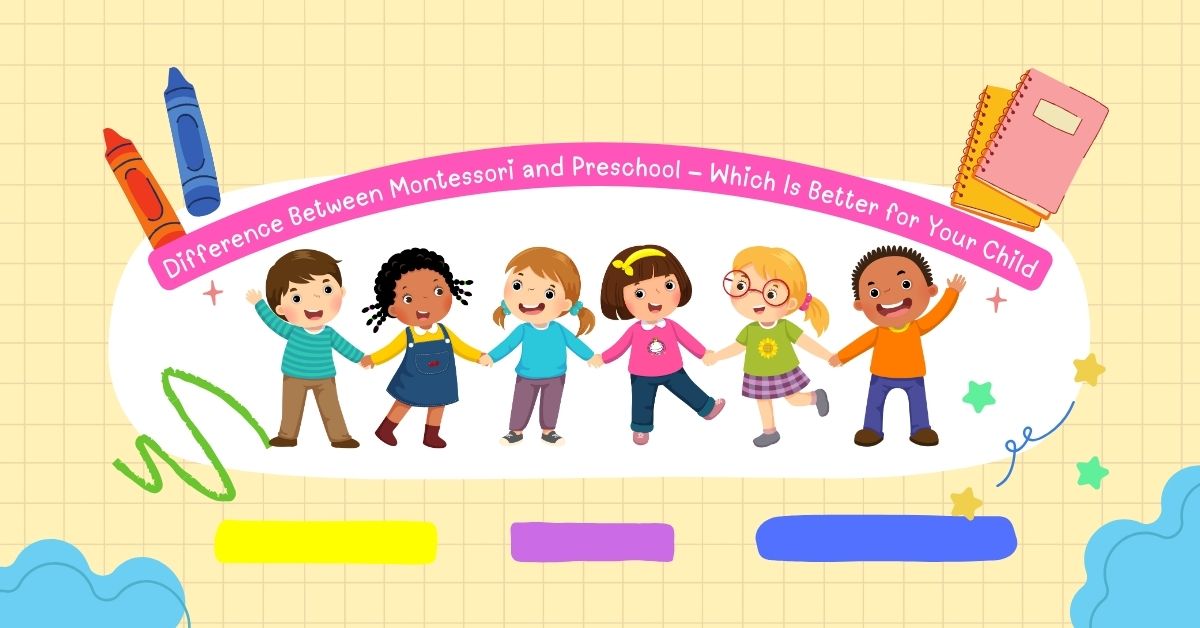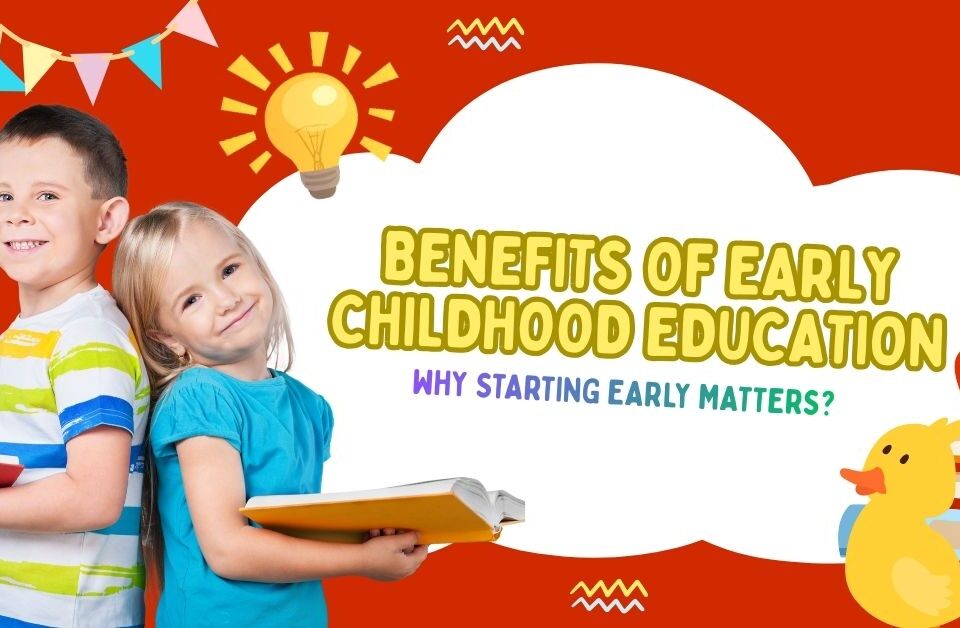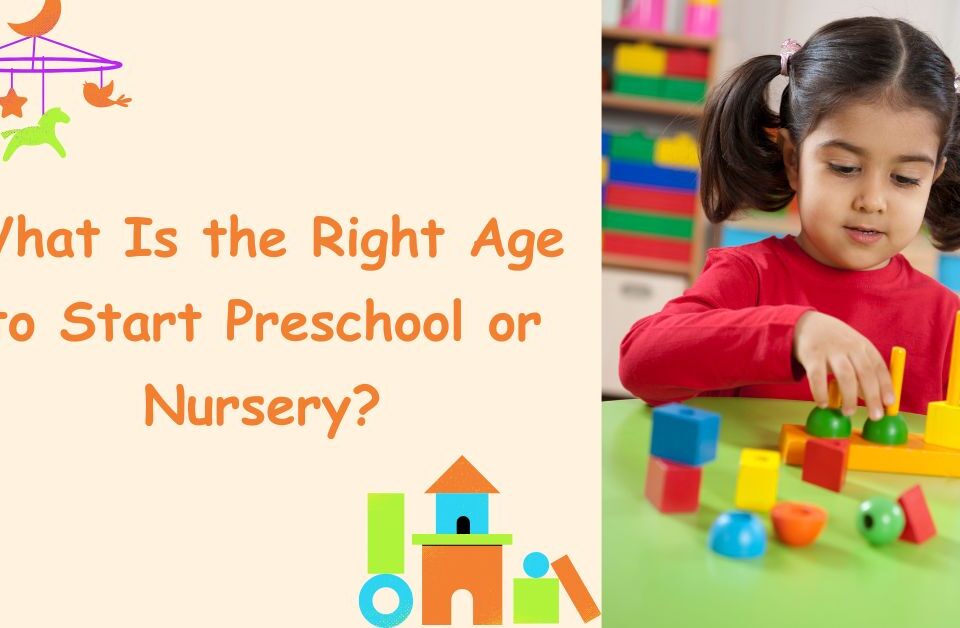
Difference Between Playschool and Preschool: Parent Guide
November 25, 2025
Daycare vs Preschool: Key Differences for Parents
November 28, 2025Difference Between Montessori and Preschool: Which One Is Better for Your Child?
Why Choosing the Right Early Learning Approach Matters
You must choose the right learning environment for your child because that plays a vital role in building their foundation. The modern education system offers multiple approaches to early childhood education; hence, the final decision can feel tricky.
A very confusing aspect of early education is the difference between Montessori and preschool. Of course, both approaches strive to support a child’s development, yet they are built on very different philosophies and learning styles.
However, between Montessori vs preschool, which is better for your child? Let this blog answer the question.
What Is the Montessori Method? Principles, Purpose & Benefits
The Montessori philosophy emphasises a child-led approach to learning. It encourages children to explore, learn, and develop at their own pace. This stems from the belief that children learn best when they are given freedom within a well-prepared environment.
1: Origin & Core Principles of the Montessori Method
The Montessori method of learning was founded by Dr Maria Montessori in the early 1900s. As mentioned before, it is centred on the idea of child-centred learning.
Hence, the focus is on independence, curiosity, intrinsic motivation, and respect for a child’s natural developmental rhythm. The teachers in a Montessori setting don’t direct. Instead, they observe and guide children to discover knowledge for themselves.
2: Inside a Montessori Classroom: How the Environment Supports Learning
A Montessori classroom is thoughtfully designed to promote independence. Children are allowed to choose their daily activities based on their interests.
Thus, every element in the classroom is arranged to support child-centred learning, responsibility, and calm exploration.
3: Montessori Teaching Method: A Hands-On, Child-Led Learning Approach
Montessori teachers act as guides rather than traditional instructors. Instead of teaching the entire class the same concept at once, children are guided individually or in small groups.
Thus, the method is hands-on, experiential, and deeply personalised. There is an obvious emphasis on practical life skills, sensory development, problem-solving, and self-discipline.
What Is a Traditional Preschool? Structure, Curriculum & Learning Style
Preschool teaching methods are designed to prepare children for formal schooling with the help of structured learning experiences. That’s why the curriculum introduces foundational academic concepts along with social, emotional, and motor skill development.
1: Approach & Teaching Style: Teacher-Led Instruction & Structured Activities
A traditional preschool generally follows a structured approach where the teacher leads the class. Children are only allowed to engage in predetermined activities like storytelling, rhymes, numbers, early writing, and theme-based projects.
Thus, the learning environment encourages active participation, routine, group activities, and the learning of basic concepts.
Also Read: How Preschool Education Prepares Kids for Lifelong Success
2: The Preschool Environment: Routine & Social Interaction
Like most early childhood learning approaches, the environment in a preschool is lively, colourful, and full of meaningful stimulation! However, the day often follows a timetable.
This exposes children to classroom routines, transitions, and age-appropriate learning experiences. Thus, they gradually learn to focus, follow instructions, and participate in class activities, which are quite important skills for higher education.
3: School Readiness: Preparing for Kindergarten
The preschool model introduces basic literacy and numeracy that prepare children for kindergarten.
It helps them build confidence in social settings, learn classroom etiquette, develop communication skills, and adapt to group learning. This sets a strong base for their schooling journey!
Also Read: Difference Between Playschool and Preschool: Parent Guide
Montessori vs Preschool: 4 Key Differences Parents Should Know
Even though both early childhood learning approaches feel quite similar, the difference between Montessori and preschool becomes clearer when you compare how children learn in each setting.
1: Teacher’s Role: Guide in Montessori vs Instructor in Preschool
According to the Montessori philosophy, the teacher is simply a guide who observes and gently supports a child’s learning journey. They do not impose the same lesson on every child because each of their needs and interests is unique.
In contrast, the teacher in a preschool leads the learning process, introduces concepts to the whole class, and ensures consistency and structure for all children equally.
2: Learning Style: Child-Led Exploration vs Structured Lessons
Between traditional preschool vs Montessori, the latter supports child-centred learning. Each child chooses what to explore, which helps them build concentration and independence.
On the other hand, a preschool follows a guided learning method with planned activities and teacher-directed lessons.
Thus, both these early childhood learning approaches encourage skill development, but Montessori prioritises self-direction, while preschool prioritises structured learning.
3: Independence Building: Montessori’s Self-Reliance vs Preschool’s Guided Participation
Independence is at the heart of the Montessori philosophy. Children learn daily life skills like pouring, tying, cleaning, and organising. This helps them in building confidence and responsibility outside the comfort of their home.
When it comes to Montessori vs preschool, the latter encourages independence, too, but within a teacher-designed setting where group learning and following instructions take priority.
4: Assessment Style: Observational Progress vs Informal Academic Evaluation
Montessori does not follow traditional assessments or comparison-based evaluation. Children are assessed only by observation and individual progress.
On the other hand, a preschool may include informal assessments, worksheets, or creative activities to ensure your child’s readiness for the next academic level.
Thus, the goal of preschool teaching methods is to familiarise children with early learning expectations.
Also Read: Playgroup vs Montessori: Key Differences & Which Is Better for Your Child
Choosing Between Montessori and Preschool: What’s Right for Your Child?
Now that you know the difference between Montessori and preschool, you have to understand that there is no universal right or wrong choice. That’s because the best early learning environment actually depends on your child’s personality, pace, and comfort.
If your child enjoys exploring freely, shows curiosity, or learns best through hands-on discovery, Montessori may suit them really well. On the other hand, if your child benefits from structure, enjoys group activities, or needs gentle preparation for school routines, a traditional preschool can offer the right balance.
There is no question of Montessori vs preschool because both approaches ensure your child’s growth and development, just in different ways.
Also Read: Difference Between Playgroup and Nursery: A Parent’s Guide
Why JBM Smart Start is the Best Preschool in Greater Noida
Shape your child’s tomorrow today at JBM Smart Start, the best preschool in Greater Noida! Here, you get a combination of modern early-learning practices, skilled educators, and a joyful learning environment. That’s how JBM Smart Start helps your child build confidence, curiosity, and readiness for a bright future! Enrol now.
Frequently Asked Questions About Montessori vs Preschool
Q1: What is the main difference between Montessori and preschool?
Ans: Montessori focuses on child-led learning and independence. However, preschool follows a structured and teacher-led approach to prepare children for formal schooling.
Q2: Is Montessori better than preschool?
Ans: Not really. Montessori suits children who enjoy self-paced, hands-on discovery, whereas preschool benefits children who thrive with routine, group learning, and early academic exposure. Hence, one is not better than the other. Instead, they’re both helpful but in different ways.
Q3: Do Montessori schools teach academics?
Ans: Yes, of course! Montessori teaches academics, but in an experiential and child-centred way rather than by using worksheets or memorising. Children learn different concepts by exploring and meaningful real-life activities!
Q4: Can children transition from Montessori to regular school?
Ans: Most children adapt really well! That’s because Montessori builds independence, confidence, and problem-solving. However, some may need additional time to adjust. For them, the next stage can be preschool!
Q5: Which learning approach builds better social skills?
Ans: Both Montessori and preschool encourage social development! Montessori offers mixed-age interaction, while preschool focuses on group collaborations within the same age range.




